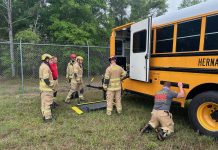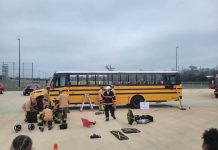Several school districts in Massachusetts and northeast Ohio made headlines last week after large numbers of yellow buses flunked safety inspections and were placed out of service. In some Massachusetts towns, one in 10 buses were taken off the road for safety violations noticed during routine inspections.
An out-of-service school bus cannot be driven, even without children in it, until it is fixed. How did this impact student transportation operations at the beginning of the school year?
Transportation Director Jeffrey Tatro of Wareham (Mass.) School District, where 15 percent of buses were taken off the road, told School Transportation News that most of the vehicles with out-of-service violations were repaired and re-inspected on the same day without any down time. The Registry of Motor Vehicles inspects every school bus in the state at least three times a year.
“No routes were disrupted because we did have backup vehicles for any vehicle that may have required a more involved repair,” said Tatro. “The problems found ranged from an oil indicator light being burnt out in the dash panel to a brake line that did burst during the panic stop test.”
Like many school districts across the nation, he said, his district has an aging bus fleet because of financial constraints. Unlike regional school districts, Wareham is not reimbursed at a state level for any regular education transportation, so all funding is derived from town and local revenue.
“Like every town, there are a lot of needs, and school buses were not a priority. We have reached the point that school bus replacement is a priority, and the town committees are working on a solution and need to come up with a plan to present to the Town Meeting,” he explained.
Carl Allen, director of transportation for Boston Public Schools, told FOX News that his school district has an aggressive, preventive-maintenance schedule every 91 days that includes pre-inspections before the highly detailed state inspections. Allen said he is proud of Boston’s “excellent” record, noting the district had a 100-percent passing rate in three straight inspections last year.
But he acknowledged the advantage of being a bigger school district with more resources. For example, Boston replaces 10 percent of its fleet each year, and the buses have an average age of 4.5 years — half the industry norm.
When asked about Wareham and other districts that had one in 10 buses fail safety inspections, Allen said, “Those kinds of major errors would tend to come from, I would think, major lapses in preventive maintenance that those districts have implemented.”
Tad Kledzik, supervisor of transportation maintenance for Pasco County (Fla.) Schools, expressed concern and surprise about number and types of safety violations uncovered, pointing out that those defective buses had been transporting school children prior to inspection.
“Bad tires and bad brakes? It’s a little scary for the kids,” Kledzik said. “We choose to schedule inspections every 25 days from an operational standpoint. To hear that it only happens once a year at some locations was startling.”
Districts Doing ‘A Very Good Job’
In Ohio, the state Highway Patrol conducts all inspections, including annual back-to-school inspections and unannounced spot inspections twice a year, according to John Charleton, a Department of Education spokesperson. But how frequently school districts conduct their own inspections remains a matter of “local control,” he added.
“School bus safety is paramount, so I hope they would do it very often,” Charleton said.
Examples of out-of-service violations range from a dirty undercarriage and bus seats patched with duct tape to more critical violations related to brakes, tires and engines.
“If they find something that’s very serious, they mark them out of service and take off the safety sticker. In that case, you don’t have to just do the repair but need a whole bus inspection. If you have a major problem — a hole in the floor, brake line, whatever — the Highway Patrol takes it very seriously,” he explained.
Currently, Robert Harmon is filling in for recently retired Ohio State Director Pete Japikse, and Charleton shared his response to the bus-inspection debacle. “He said most of the districts do a very good job of taking care of the buses, oftentimes on a limited budget. The mechanics take great pride in what they do, and it is a priority with Highway Patrol and with districts to make sure the buses are in good working condition,” he relayed.
Kathy Kiehl, director of transportation for Akron City Schools, told STN that the Highway Patrol found various violations in 46 out of their 89 buses. Eleven of the buses had “not out-of-service” defects, such as minor light bulbs being out or a mirror bracket being loose.
“Thirty-five buses were noted to have ‘out-of-service’ defects such as exhaust leaks … air brake chamber distance difference, alcohol hand sanitizer found on the bus, such as Purel, and the backup alarm not being loud enough,” Kiehl said, noting that the latter is not checked by a decibel meter but determined by the inspector.
During the annual inspection, there were only a few schools in session, she continued, so they did not lose any transport time despite dozens of buses being out of service. All defects were immediately repaired and re-inspected the same day, and by the time the inspectors left, all buses were 100-percent qualified and safe to be on the road, she added.
Kiehl said the district’s buses range from a 1991 model to a 2011, with the average age about 12.5 years.
“With the cost of a regular transit bus at about $90,000, we keep them as long as possible,” she remarked. “Budget is the key word, as we are on the November city ballot for operating funds.”















